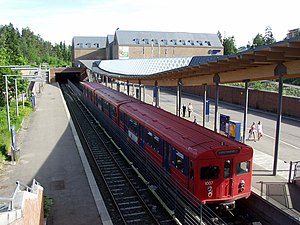T1300 train
| T1000/T1300 | |
|---|---|

A T1000 unit at Mortensrud.
|
|
| In service | 1966–2010 |
| Manufacturer | Strømmens Verksted, NEBB, Høka and AEG |
| Constructed | 1960–1976 (T1000) 1978–1981 (T1300) |
| Refurbishment | 1985–1989 (modification of 16 T1000 cars to T1300 cars) 1995–1998 (interior and exterior refurbishment of all cars) |
| Scrapped | 1983–2011 |
| Number built | 197 cars (162 T1000 cars, 35 T1300 cars; later 146 T1000 cars and 49 T1300 cars) |
| Number preserved | 11 cars (7 T1000 cars, 4 T1300 cars) |
| Number scrapped | 186 cars |
| Formation | 2, 3, 4 or 6 cars per trainset |
| Capacity | 154–180 |
| Operator(s) | Oslo T-banedrift |
| Depot(s) | Avløs, Majorstuen, Ryen |
| Line(s) served | All Oslo Metro lines |
| Specifications | |
| Car length | 17.000 m (55.774 ft) |
| Width | 3.200 m (10.50 ft) |
| Height | 3.650 m (11.98 ft) |
| Doors | 3 per side (6 per car) |
| Maximum speed | 70 km/h (43 mph) |
| Weight | 29.740 t (29.270 long tons; 32.783 short tons) |
| Power output | 392 kW (526 hp) |
| Electric system(s) | 750 V DC |
| Current collection method |
Contact shoe / Pantograph (T1300 only) |
| Safety system(s) | ATP |
| Track gauge | 1,435 mm (4 ft 8 1⁄2 in) |
T1000 and T1300 were two rapid transit train classes used on Oslo Metro in Oslo, Norway. The 197 cars were built by Strømmens Verksted, Norsk Elektrisk & Brown Boveri and AEG between 1960 and 1981. They were the first metro trains used in Oslo, and had remained in active use until being replaced by OS MX3000 trains in 2007. Each car is equipped with a driver's cab at one or both ends and four motors, each with 98 kilowatts (131 hp). The cars are 17 meters (56 ft) long, 3.2 meters (10 ft) wide and 3.65 meters (12.0 ft) tall. The trains use 750 V current, and are capable of 70 kilometres per hour (43 mph). Signaling is provided through automatic train protection.
In 1960, two less powerful T single-car units were built, designed to be prototypes used on the Oslo Tramway. After a one-year trial, they were put into scheduled traffic to the Kolsås Line, where they remained in regular service until 1983. The production series is somewhat different in design and performance. T1000 is both used to refer to the class as a whole, or the first 162 cars, that are only equipped with third-rail shoes. They have four slight variations, which have been given the designations T1–T4. The T1300 is a series of 33 new and sixteen rebuilt T4 trains equipped with pantographs which previously allowed them operate on the western part of the network, prior to it being upgraded to third-rail metro standards. The newer units were designated T5 and T6, while the rebuilt units were designated T7 and T8.
In 1954, the Oslo City Council decided to build a four-line metro to the new suburbs to the east of the city center. The plans would lead to the system opening in 1966, after the conversion of the Østensjø and the Lambertseter Line of the Oslo Tramway to metro standard, and supplemented with the new Furuset and Grorud Line. The system would feature higher and longer platforms, allowing step-free access to six-car trains, automatic train protection and third rail power supply. This would make the metro incompatible with the existing tramways.
...
Wikipedia
